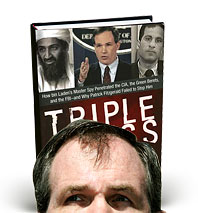
Patrick Fitzgerald, U.S. Attorney for Illinois’s Northern District, doesn’t pull his punches. Charming, tough, and named one of People’s “sexiest men alive” in 2005, he took down Governor Rod Blagojevich (as well as his predecessor) and got the Times’ Judith Miller imprisoned during the investigation that ended with Scooter Libby’s conviction. Now he’s threatening to take another journalist to court, for defamation and libel. And this time, it’s personal. He’s acting as a private citizen defending his public name.
The book in question is Peter Lance’s Triple Cross, which was published in November 2006 by Regan Books, a division of HarperCollins. Lance examines how the FBI and the U.S. Attorney in New York prosecuted terrorists before 9/11, including Sheik Omar Abdel Rahman and those who blew up the U.S. embassies in Africa. At that time, Fitzgerald worked for the U.S. Attorney in New York. Lance alleges that Fitzgerald discounted information Lance contends arguably pointed to the existence of a possible Al Qaeda cell in New York five years prior to 9/11. Nearly a year after Triple Cross was published, in the lull between Libby and Blagojevich, Fitzgerald sent an eleven-page letter to HarperCollins (listing a private P.O. box as a return address, to prevent confusion with his official duties). It alleged that “Triple Cross makes a number of statements of fact which defame me (and others) and which are easily proven to be objectively false.” He listed a few examples and asked the house to stop selling all hardcovers, refrain from printing another edition, and acknowledge the errors written about him. HarperCollins’s general counsel wrote back, conceding that one date had been wrong but denying his other claims and concluding that “we stand behind Mr. Lance” and would go ahead with the paperback, “which we regard as an important work of investigative journalism.”
Fitzgerald responded with an even longer letter. Thereafter, HarperCollins had a lawyer re-vet the entire book—a process that took fourteen months. Fitzgerald followed up again last September, noting that “surely, HarperCollins can make a decision in a year. And if it cannot feel comfortable proceeding after another eleven months of thought, that ought to tell HarperCollins something about its confidence level in the book.”
HarperCollins made a series of corrections, including changes in phrasing, for the paperback edition—which finally comes out June 16, complete with a new introduction that’s mainly about Fitzgerald’s attempts to quash the book. Last week, Fitzgerald sent one more letter, which ended with “To put it plain and simple, if in fact you publish the book this month and it defames me or casts me in a false light, HarperCollins will be sued.”
Lance is busy drumming up support—and publicity—for the book. He’s holding a press conference on the 16th, when he’ll be flanked by lefty anti-censorship activist librarian Ann Sparanese and the lawyer played by John Travolta in A Civil Action, Jan Schlichtmann. The truth is, this may be the best thing that ever happened to Lance. “That’s the ultimate irony,” Lance says. “It wasn’t reviewed by a single U.S. publication. If Patrick Fitzgerald had not attempted to kill it, it would have just gone off into publishing obscurity. This is the true lesson of censorship.”
Fitzgerald, on the other hand, doesn’t need the attention. In response to a request put through to his office, Fitzgerald called back personally to say he had no comment, adding that on this personal matter, he could be reached only through the P.O. box.
Have good intel? Send tips to [email protected].